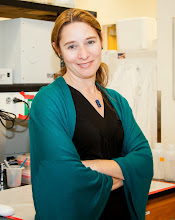I while back I posted about how to deal with
Q&A
sessions from the speaker’s perspective. More often, however, we’re in the
audience.
As an audience member,
how do we ask good questions?
I think the answer is simple, but it’s not always obvious,
or at least, not always followed.
Simply state your question, then be silent. Don’t preface your question with a story or a lot of
data. Don’t make several
comments-this is Q&A time, not comment time. And please, be polite. I’m not saying you shouldn’t engage
the speaker if you feel that he or she missed something important, and be all
means talk with them if you have findings that fit with theirs, or if you have
new insight into their work. In my
opinion, however, these discussions – for that’s what they are, should be left
after the talk when there’s time for a lengthier chat, and when a room full of
grad students or nervous podium speakers isn’t listening in.
I think that F.D. Roosevelt’s advice on public speaking
applies best to asking questions during Q&A: “Be sincere; be brief; be seated.”

